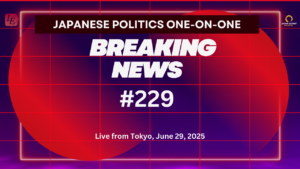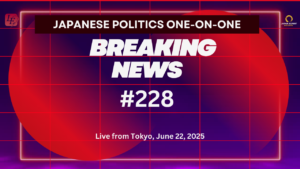Welcome to the 176th session of Langley Esquire and Japan Expert Insights‘ Japanese Politics One-on-One weekly series.
The ordinary Diet session, which began on January 26 and is constitutionally set for 150 days, formally ends today, June 23 (although the Japanese parliament effectively wrapped it up on Friday, the 21st.) This may give the Prime Minister a much-needed respite after a hectic final week filled with last-minute efforts on key bills and a tense debate with opposition party leaders. Before we shift our focus to the next big developments in Japanese politics, let’s take a look back at recent events:
- The ordinary session of the Diet formally ends today
- Tomorrow (June 24th) marks the 70th anniversary of the End of the Battle of Okinawa
- The Political Reform Bill passes the Upper House
- The first Diet Debate was held between Prime Minister Kishida and Opposition Party Leaders (including the CDP, Ishin, JCP, and DPFP)
- The Paris Olympics Starts in 1 Month 2 Days
So, let’s dive deeper into this and what-else transpired over this dramatic past week:
US Treasury Places Japan’s Currency on a Watchlist
The US Treasury has recently placed Japan’s currency on a watchlist, highlighting the ongoing fluctuations of the Japanese yen. Though no major economies aligned with the United States were identified as “engaging in currency manipulation” over the year, the report states, Japan injected six trillion yen into its economy about a month ago to support the yen—so the report is somewhat curious.
In any event, it appears that the Bank of Japan and the Ministry of Finance are resigned to allow the yen to find its own level. This strategy does not bode well for those hoping for a stronger yen. As a result, the yen continues to hover near the $/¥160-yen mark. Meanwhile, no significant intervention from the Bank of Japan is anticipated. We expect the yen to go way beyond $/¥160.
The Japanese economy is already struggling. With the onset of summer and anticipated rises in air conditioning and transportation costs, the future of Japan’s economic stability is uncertain.
Political Reform Bill Passes the Upper House
The Bill passed on Wednesday, following its Lower House approval last Friday. Prime Minister Kishida secured Ishin-no-Kai’s support by negotiating key reforms to enhance transparency. The reforms include lowering donor disclosure thresholds and tightening event regulations. Furthermore, the Bill mandates detailed reporting on the use of political funds.
In the Lower House, the LDP’s supermajority ensured passage while in the Upper House, the party required additional support. Despite initial cooperation, Ishin-no-Kai accused the Prime Minister and the LDP of misleading them about the law’s timeline. This led to their withdrawal of support. Despite this, the Bill passed with full universal support from the LDP and Komeito. Meanwhile all opposition parties voted against it.
This episode highlights ongoing political tensions and the fragile nature of alliances. Although the cooperation between Ishin and the LDP had shown promise, recent disagreements have strained this relationship. The lack of clear communication between key political figures has exacerbated the situation. This again illustrates the unpredictable nature of political alliances.
As a result, the Prime Minister faces increasing pressure, and the evolving dynamics with Ishin will be critical in the coming weeks. While recent setbacks have strained relationships, there may still be opportunities for the LDP to rebuild bridges and navigate future challenges.
Intense Legislative Activity Marks Final Days of Diet Session
In other significant developments, the six-year plan for the basic policy for economic and fiscal management and reform passed on Friday. Legislation passed in the final days of any Diet session often indicate intense caucusing and difficult negotiations. As these Bills are usually contentious they face substantial opposition before being pushed through at the last moment.
Along these lines, there has been ongoing discussion about increasing charges for foreigners visiting Japan. The government is exploring all possible avenues to boost revenue, indicating a comprehensive approach to economic management. These discussions are happening nationwide and require close monitoring.
Policy Implications
The passage of the Fiscal Reform Act signals the Japanese government’s decision, led by the LDP, to balance the budget by 2025. This decision has wide-ranging implications for defense spending and for expenditures and tax revenues.
Putin Surprise Visit to North Korea Solidifies Alliance
President Putin’s recent visit to North Korea lasted two days and garnered extensive attention in Japan. Initially hinted to occur within weeks or months, the visit resulted in a significant Mutual Security Agreement with Kim Jong-un. The agreement obligates each country to defend the other if attacked, marking a substantial shift in regional security dynamics and raising international concerns.
After North Korea, Putin visited Vietnam, which drew less concern. However, the developments in North Korea indicate an evolving geopolitical landscape that warrants close attention.
Prime Minister of New Zealand Visits Japan
New Zealand Prime Minister Christopher Luxon visited Japan early in the week, marking an important diplomatic event. During the visit, several information security agreements were signed between PM Luxon and his Japanese counterpart. The trip was deemed highly successful, reflecting positive developments in bilateral relations.
Prime Minister Vying for Re-election Amid Political Pressure
Prime Minister Kishida faces scrutiny as he navigates turbulent political waters. Contrary to expectations, he has decided against calling a snap-election or reshuffling his Cabinet, a departure from his earlier approach that has raised eyebrows within his party and beyond.
Despite criticisms, Kishida plans to run for re-election as LDP president in September. Historically, incumbents seeking re-election have a strong track record, with only one defeat in the last 44 elections. However, Japan’s current political climate, influenced by economic and geopolitical challenges, remains unpredictable as criticism against Kishida comes not only from opposition parties but also from local LDP chapters and Diet members calling for new leadership. As the recent Diet session concluded, this dissent has grown, signaling a shift in party dynamics. This is important.
As the Diet ends, parliamentarians return to their districts to engage with constituents and prepare for upcoming elections. With the presidential and potential snap-elections looming, political activities will intensify. Understandably, this will determine future leadership and set the stage for hugely-significant political maneuvering.
With the presidential race taking center stage, this summer and autumn promise to be pivotal for Japanese politics.
New Approval Rating Places Prime Minister Kishida Among the Lowest in the G7
Recent reports from Jiji Press and NHK highlight a stark contrast in the public’s perception of Prime Minister Kishida. NHK presents a relatively softer view with an approval rating of ~22%, whereas Jiji Press paints a more critical picture, estimating it ~18%. These figures mark the lowest approval ratings among G7 leaders and underscore significant domestic discontent.
After the G7 summit in Italy, Kishida returned to see these dismal ratings. This international context adds pressure as he faces both supportive gestures and skeptical glances from fellow leaders. The disparity in approval ratings reflects a challenging period for his administration, prompting introspection and strategic recalibration. His public-standing is the lowest among all G-7 leaders. As political dynamics unfold, the upcoming weeks will likely see heightened scrutiny and strategic maneuvering within Japan’s political landscape. The Prime Minister’s ability to navigate these challenges will be closely watched and will shape future domestic and international perceptions of his leadership.
What’s New in the Latest Honebuto no Hoshin?
In a last-minute Friday approval, Japanese government passed this week the Honebuto no Hoshin, officially titled the Basic Policy for Economic and Fiscal Management and Reform for 2024. This landmark legislation aims to address Japan’s staggering budget deficit, which is currently at 250% of GDP, the highest among G20 countries, exacerbated by financial strains from the COVID-19 pandemic.
Policy Implications
The ambitious plan focuses on aligning expenditures with tax revenues, a daunting task amidst current economic challenges. It sets the stage for heated debate within the Liberal Democratic Party (LDP). Proponents argue for increased government spending to stimulate the economy through subsidies and infrastructure projects, despite factors like fluctuating yen, oil prices, and global conflicts such as the Ukraine war. Conversely, fiscal conservatives stress the unsustainability of the 250% deficit-to-GDP ratio and advocate for tighter budget controls to stabilize the economy and address financial instability. Managing the yen’s volatility and supporting its value without resorting to currency manipulation adds further complexity to Japan’s economic strategy.
With Japan grappling with economic stagnation over the past two (four?!?) decades, the Honebuto no Hoshin policy signifies a crucial step towards fiscal responsibility and aims to navigate these challenges to revitalize the nation’s economy.
56 Candidates Ready to Run for Tokyo Gubernatorial Election
The Tokyo Gubernatorial elections are in full swing with an unprecedented 56 candidates vying for the position. This has posed a logistical challenge for the Tokyo Metropolitan Government, which has set up 14,000 billboards across the city, each equipped with 48 slots for candidate posters. However, with 56 candidates in the race, eight will miss out on designated slots.
To address this, the Tokyo Metropolitan Government implemented a lottery system: candidates who didn’t secure a billboard slot through the lottery can still participate by stapling their posters to the sides of the billboards. Notably, volunteers, not the government, handle this posting, potentially leaving candidates without strong volunteer support struggling to gain visibility.
Each candidate pays a 3-million-yen entry fee. This fee affords them five and a half minutes of television airtime twice during the campaign, along with radio airtime. However, winning might not be every candidate’s primary goal as the campaign offers valuable exposure and a chance to promote business connections. If a candidate manages to secure at least 10% of the vote, they will receive back a significant portion of their 3-million-yen fee; falling short means losing the fee.
Tsuyu (Rainy Season) Begins in Japan Amid Global Heatwave
Currently, the Northern Hemisphere is in the grip of a massive heatwave while Japan’s “tsuyu” rainy season has unofficially begun. As many expect a scorching summer ahead, electric companies like TEPCO are preparing for increased air conditioning demand.
Government to Introduce Taxes for Tourists Amid Japan’s Tourism Boom
Tourism in Japan is booming, with May recording 3.04 million visitors, a 9.6% increase from the peak of pre-Covid 2019. This surge marks Japan as a top global destination, bolstered by a favorable yen exchange rate that makes it more affordable than in previous years.
However, this influx poses challenges with some hot-spots thinking of raising fees for foreigners. This is in addition to Mount Fuji that restricts daily climbers to 4,000 and charges a 2,000 yen fee, a shift from its free access in the past, driven by concerns over visitor impact. The surge also impacts local businesses, with some adapting menus for foreign tastes, which can alienate locals accustomed to traditional offerings… plus out-price them. This cultural shift and economic considerations like a 30% decrease in defense spending due to yen devaluation, underscore the complexities Japan faces in balancing tourism growth with economic and social concerns.
Questions & Comments
- US President Joe Biden and former US President Donald Trump will debate on Friday in Japan (9:00 a.m.), an event with significant implications for Asia. What are your thoughts on what to expect in the debate?
- Why does the LDP under Prime Minister Kishida struggle to find a candidate to challenge Governor Koike and Ms. Renho?
- Isn’t bringing back trash bins a civic duty of any government for its populace, sadly neglected in favor of saving a few yen?
- Will Shinji Ishimaru win the Tokyo Governor election race?
- Is it LDP Secretary General Motegi’s intention to request Prime Minister Kishida not to run for the presidency, said to be the same shouted-demand of local LDP chapter members in Hokkaido?
- With uncertain American politics in the background, is Japan ready to defend itself from China, Russia, and N. Korea? If not, is Japan moving in the right direction?
- With regard to the Reform Legislation Act for Political Funds, could you let us know the final effective date of the Bill passed by the Upper House? Were any modifications made during the Upper House discussion?
- Regarding JPY being on the ‘watch list’ by the US Treasury, could you tell me whether this happened after the BOJ recently purchased their bonds again, or before that?
- Many people think that Ms. Renho will lose because she represents all of the opposition parties, which will prevent her from making strong promises and give her the pressure to please all of the opposition parties. Do you agree with this assessment?
- It seems there is no pre-approval before election posters actually get posted. But taking them down or defacing them is illegal, right? What is the reason behind this?
Are you familiar with “Tokyo on Fire”? Episodes can be found on YouTube “Langley Esquire”: excruciatingly-gained insights sifted over 40 years in-country! Entertainingly presented.
“Japanese Politics One-on-One” episodes are on YouTube “Japan Expert Insights”. Tune-in every week to do that AND to keep ahead of a constantly swirling curve!
If you gain insight from these briefings, consider a tailored one for your Executive Team or for passing-through-Tokyo heavyweights.
To learn more about advocacy in Japan, read our article “Understanding the Dynamics of Lobbying in Japan.”
Join the Success!
Experience exceptional, personalized solutions designed to meet your business’s specific needs. Discover how we can elevate your operations to the next level.




